Reading and Writing Robert Frost with Jodie Hollander
Saturday, March 14 | 12:30 – 2:30 ET
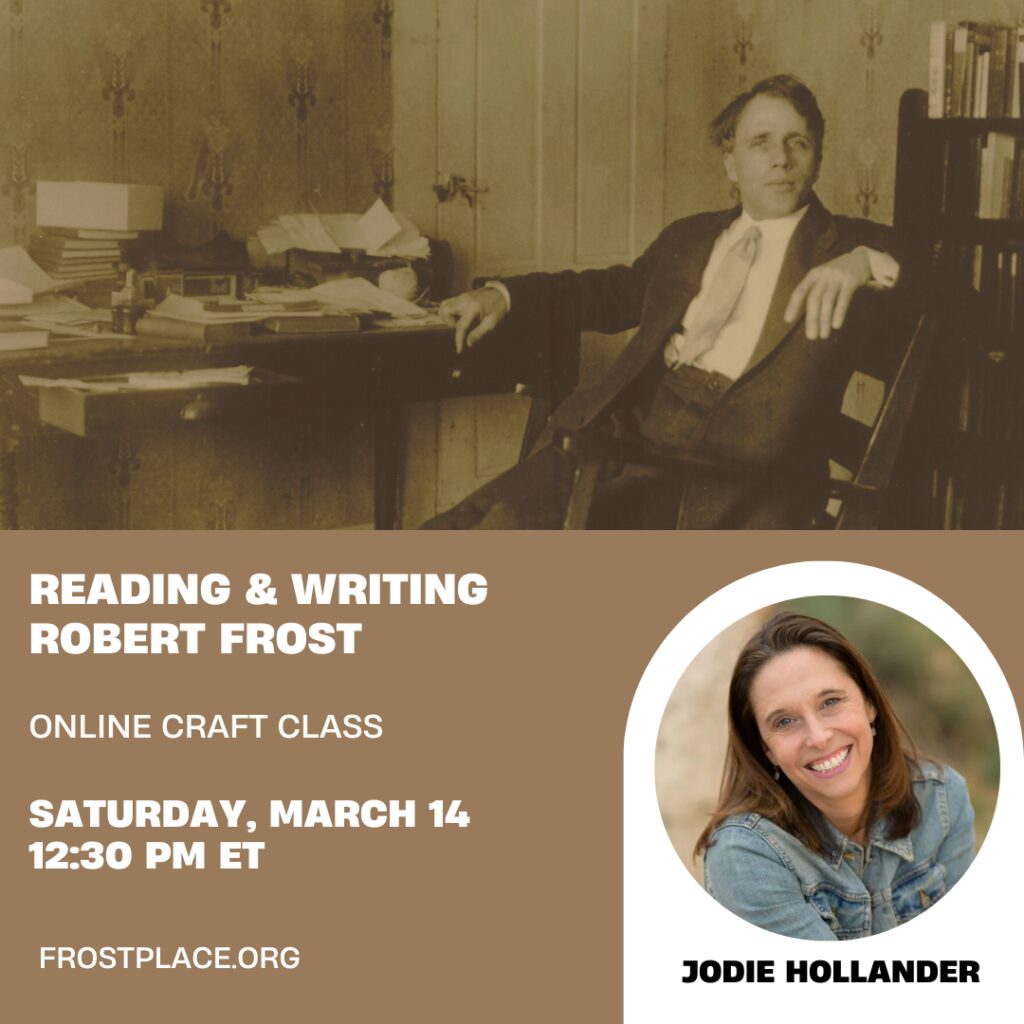
Reading and Writing Robert Frost with Jodie Hollander
John F. Kennedy famously said that Robert Frost, “bequeathed his nation a body of imperishable verse.” From his mastery of traditional verse forms and metrics, to depictions of rural New England, to his command of American colloquial speech, arguably, no poet is more essential to an understanding of American poetry than Robert Frost.
About Jodie Hollander
Jodie Hollander’s work has appeared in The Atlantic Monthly, The Poetry Review, Poetry Magazine, The Yale Review, The Harvard Review, Poetry, PN Review, The Kenyon Review, Poetry London, The Hudson Review, The Dark Horse, The New Criterion, The Rialto, Verse Daily, The Best Australian Poems of 2011, and The Best Australian Poems of 2015. Her debut full-length collection, My Dark Horses, was published with Liverpool University Press & Oxford University Press. Her second collection, Nocturne, was also published with Liverpool & Oxford University Press in 2023 and was longlisted for the Laurel Prize in nature writing. Hollander is the recipient of a MacDowell fellowship and a Fulbright fellowship in South Africa. She is also the originator of ‘Poetry in the Parks,’ in conjunction with several National Parks and Monuments in the US. In 2024, Hollander was the first poet in residence for the Elmet Trust in the Calder Valley, where she wrote and taught out of the childhood home of Ted Hughes. In September of 2025, she was the visiting poet at Frost Place in Franconia, New Hampshire. She lives in Flagstaff, Arizona. www.jodieholander.com
Writing Odes: Elevating the Everyday with Dilruba Ahmed
Saturday, April 11 – 12:30 – 2:30 ET
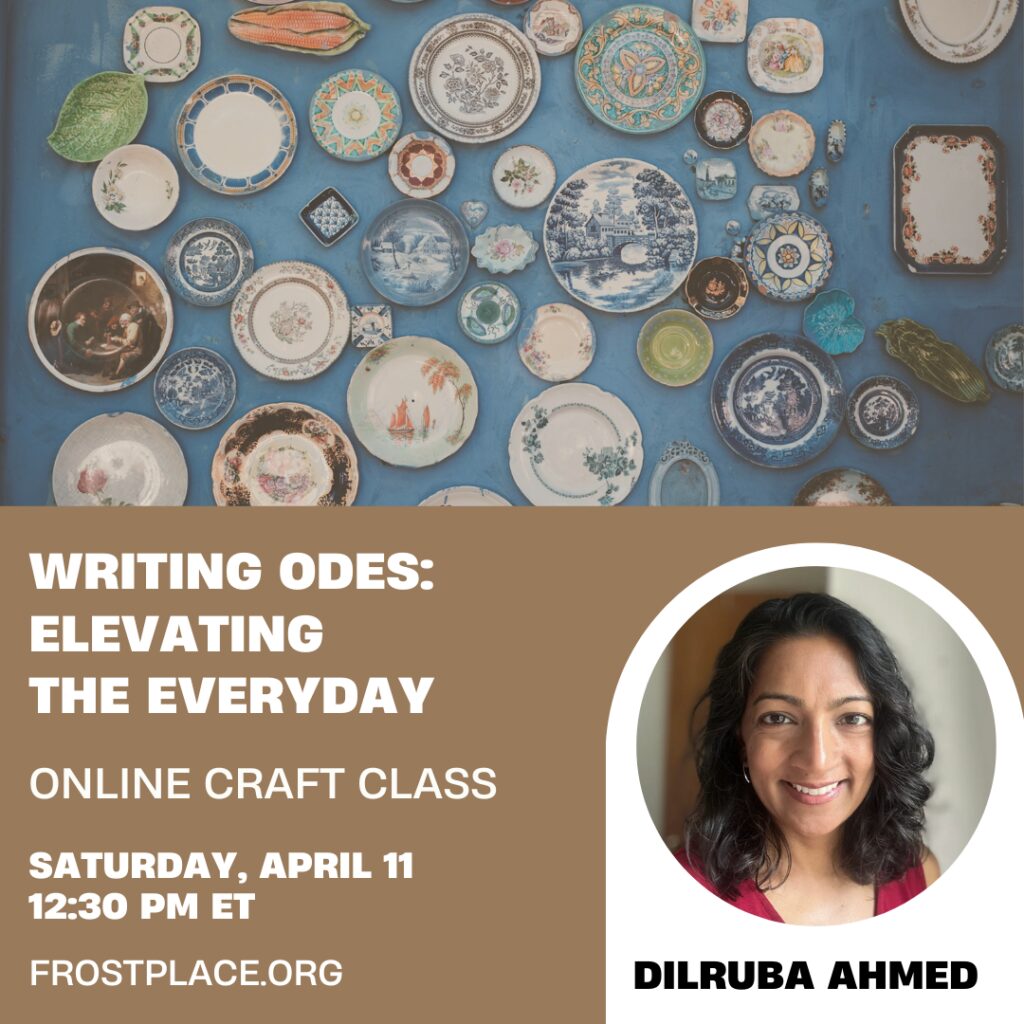
How might the ode illuminate and celebrate seemingly ordinary aspects of life in ways that reveal new understandings? Join us to unpack how form and content come together to celebrate both the elevated and the mundane in a curated packet of poetry. Together, we’ll identify the key craft strategies at play in several contemporary odes, including work by Safia Elhillo, Ellen Bass, Lucille Clifton, and Kevin Young. In addition to our discussion, this class will include quiet writing time with poetry prompts inspired by key examples.
About Dilruba Ahmed
Dilruba (Ruba) Ahmed is the author of Bring Now the Angels (Pitt Poetry), with poems featured in New York Times Magazine, The Slowdown, and Poetry Unbound. Her debut book, Dhaka Dust (Graywolf Press), won the Bakeless Prize. Her poems have appeared in Kenyon Review, New England Review, Ploughshares, and Virginia Quarterly Review. Her work has also been anthologized in Best American Poetry; Halal If You Hear Me; New Moons: Contemporary Writing by North American Muslims; They Rise Like A Wave: An Anthology of Asian American Women Poets; and elsewhere.
Ahmed received The Florida Review’s Editors’ Award, a Dorothy Sargent Rosenberg Memorial Prize, and the Katharine Bakeless Nason Fellowship awarded by the Bread Loaf Writers Conference. She holds B.Phil and M.A.T. degrees from the University of Pittsburgh and an MFA in Creative Writing from Warren Wilson College’s MFA Program for Writers. She has taught with Chatham University’s MFA Program, Bryn Mawr College, Swarthmore College, Hugo House, and elsewhere. In 2021, she joined the faculty at Warren Wilson College’s MFA Program for Writers. www.dilrubaahmed.com
The Fine Print: We’re honored to offer online craft classes with some of America’s best poet-teachers. Unless otherwise specified, classes will be held on Zoom. Classes require a minimum of 4 participants and will be capped at 10. Tuition is $150, and financial aid may be available. Details regarding cancellations and refunds can be found on our policy page. Questions? Email us at frost@frostplace.org.
Previous Classes in 2026
An Exploration of Thingness with Joan Larkin
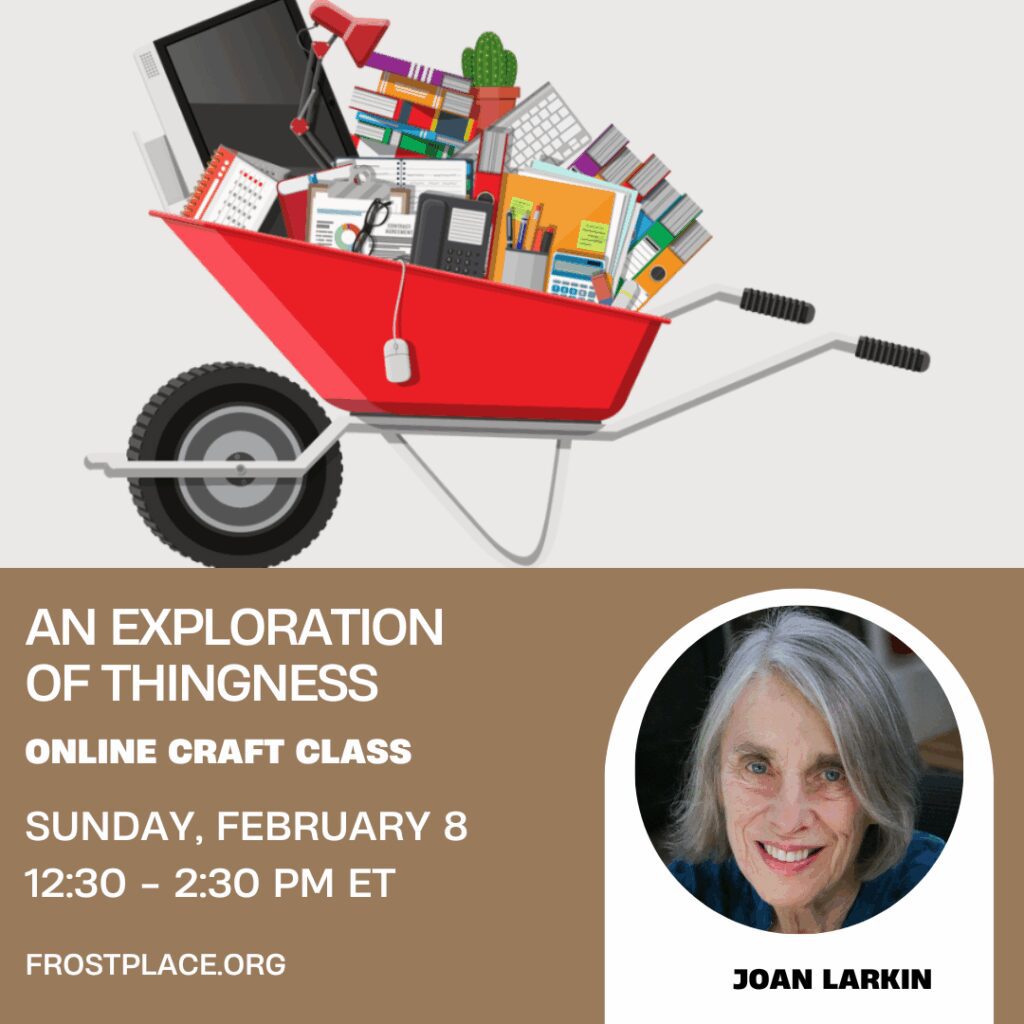
A red wheelbarrow, a steel coupler, and “an oh! of pain”: What, exactly, does depend upon “things” in poems?
In the decades since William Carlos Williams wrote the now-famous phrase “no ideas but in things,” it has been axiomatic that poems should ground ideas and feelings in particulars––things we can see and touch in the physical world. Most of us take for granted that part of a poet’s work is to find the sensory details that evoke an object (or person or place) with exactness. Perhaps, too, it goes without saying that there is more to a complete poetic statement than vivid physical representation.
In this workshop, we’ll look closely at poems that enter into story and deep feeling through a particular object or group of objects, often with a dive into greater emotional intensity. We’ll explore this process in work by Elizabeth Bishop, Hart Crane, Lucille Clifton, Eduardo Corral, Diana Delgado, Diane Seuss, and Jean Valentine. Where relevant to our exploration, we’ll extend the notion of “thingness” to include memorable sensory images beyond those that are purely visual.
The “things” that matter in these poems are particular to each poet and inhabit the imagination under pressure, resonating from a depth. Workshop participants will be asked to consider an object or objects that compel their attention and will take away suggestions for a warm-up exercise and longer poem prompt sparked by the examples we’ve discussed.
Joan Larkin is the author of six collections of poetry, most recently Old Stranger (Alice James Books). Cold River (Painted Leaf Press) received the Lambda Literary Award for Poetry, and My Body: New and Selected Poems (Hanging Loose Press) received the Publishing Triangle’s Audre Lorde Award. A Lambda Literary Award for Poetry also went to the groundbreaking anthology she coedited with Carl Morse, Gay and Lesbian Poetry in Our Time (St. Martin’s Press).
Joan co-translated Sor Juana’s Love Poems, a bilingual edition of poetry by Sor Juana Ines de la Cruz, with Jaime Manrique. Her prose includes If You Want What We Have: Sponsorship Meditations and Glad Day: Daily Meditations for GLBTQ People (Hazelden). Her plays include The AIDS Passion, The Living,If You Were Going to Get a Pet, and Wiretap. She has been awarded fellowships by the National Endowment for the Arts, the New York Foundation for the Arts, the Academy of American Poets, and the Massachusetts Cultural Council, and is a recipient of the Shelley Memorial Award from the Poetry Society of America. A lifelong teacher, she has served on the faculties of Brooklyn College, Sarah Lawrence, Smith, and Columbia Chicago, among others. She lives in Northern New Jersey. https://joanlarkin.com/
Previous Classes in 2025
Twists, Turns and Tumbles: Syntax and the Art of Poetic Surprise with Angela Narciso Torres
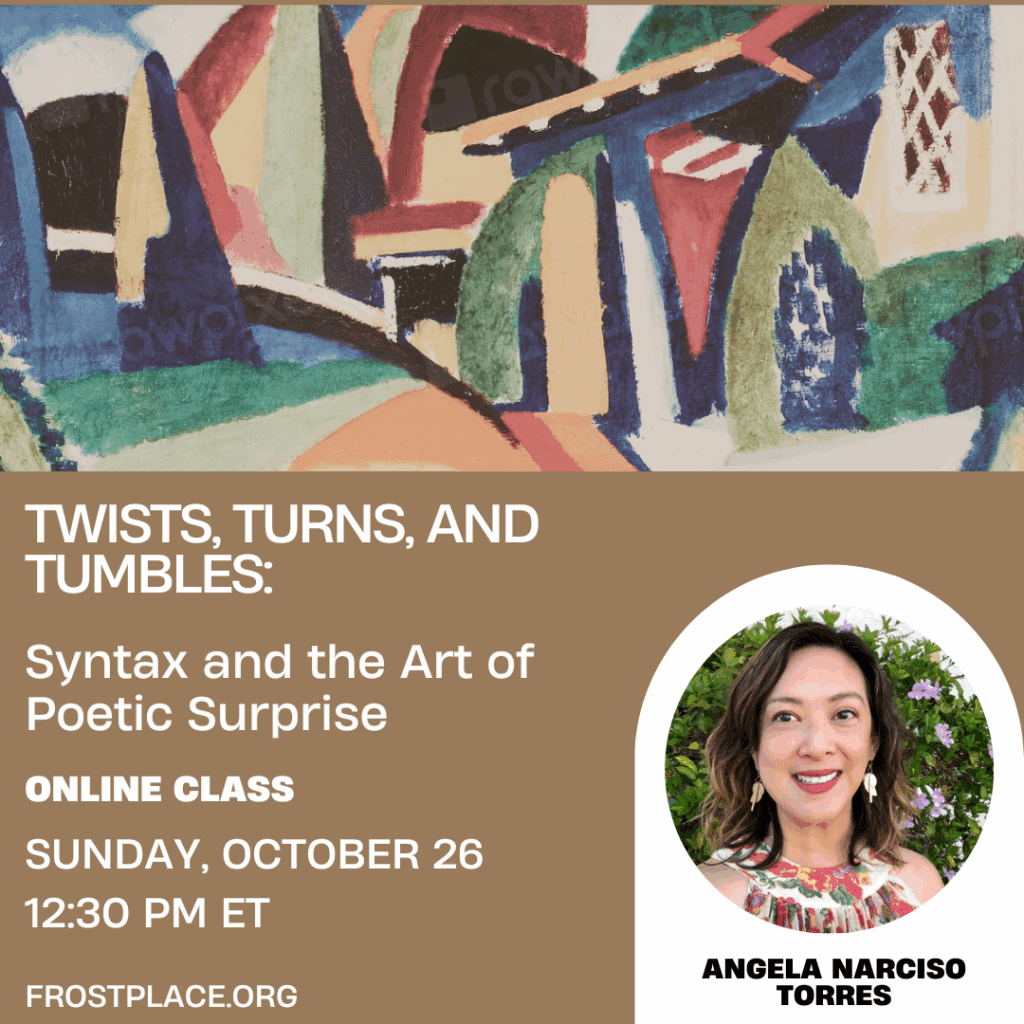
This class will explore the dynamic interplay between syntax and the element of surprise in poetry. We’ll examine how various contemporary and classic poets manipulate word order, sentence structure, and the tension between sentence and line to challenge reader’s expectations and build layers of meaning. Through close discussion of works by Emily Dickinson, Ocean Vuong, Carl Phillips, Natalie Diaz, Ross Gay, and others, participants will gain an understanding of how syntax influences pacing and tone, creates meaning, and contributes to the overall impact of a poem with a view to applying this knowledge to their own writing.
Angela Narciso Torres is the author of What Happens Is Neither (Four Way Books), Blood Orange (Willow Books Award for Poetry) and the chapbook, To the Bone (Sundress Publications). Recent work appears in Alaska Quarterly Review, 32 Poems, and Poetry Northwest. A graduate of Warren Wilson MFA Program and Harvard Graduate School of Education, Angela has received fellowships from Bread Loaf Writers’ Conference, Illinois Arts Council, and Ragdale Foundation. She received the Yeats Poetry Prize (W.B. Yeats Society of New York) and was named one of NewCity Magazine’s Chicago’s Lit 50. Born in Brooklyn and raised in Manila, she lives in San Diego and serves as reviews editor for RHINO.
Reading and Writing Robert Frost & Writing Nature in Place with Jodie Hollander
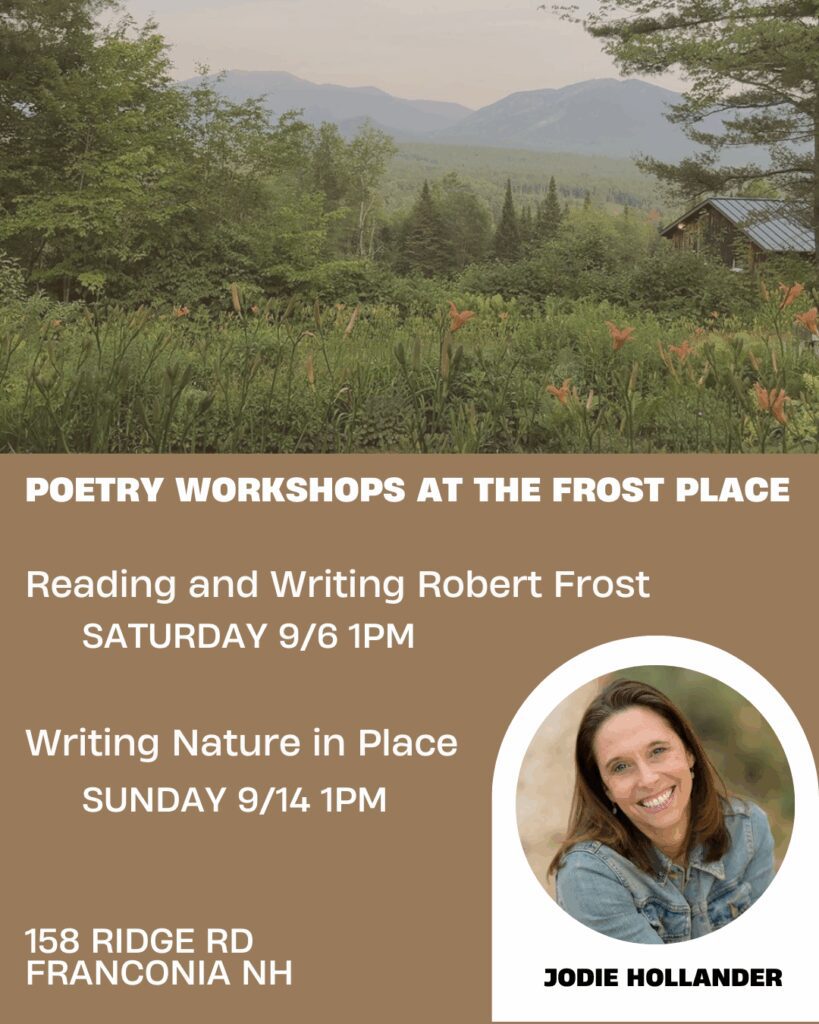
Reading and Writing Robert Frost: In this course, we will examine several of Frost’s poems closely, listen to him read his own work, and gather insights from his interviews and biography. We’ll look at Frost’s use of trimeter, iambic pentameter, and blank verse, consider his unmistakable tone and use of the dramatic monologue, consider themes such as duplicity, isolation, nature, and existential questioning, and then try our hand and our poems.
Writing Nature in Place: Drawing inspiration from the natural beauty around us, this workshop offers participants an opportunity to take in nature and turn their observations into powerful and vivid poems. In this course, we’ll study examples of celebrated poems that effectively capture the wonder and beauty of nature. We’ll also discuss techniques such as metaphor, imagery, repetition, and sound as well as cover effective use of line breaks. No experience necessary.
About Jodie Hollander
Jodie Hollander, originally from Milwaukee, Wisconsin, was raised in a family of classical musicians. She studied poetry in England, and her poems have appeared in journals such as The Atlantic Monthly, The Poetry Review, The Yale Review, The Harvard Review, PN Review, The Dark Horse, The New Criterion, The Rialto, Verse Daily, The Best Australian Poems of 2011, and The Best Australian Poems of 2015.
She is the recipient of a Fulbright Fellowship in South Africa, a National Endowment for the Humanities Grant in Italy, a Hawthornden Fellowship in Scotland, and attended MacDowell in 2015. Her debut full-length collection, My Dark Horses, was published with Liverpool University Press (Pavilion Poetry) in 2017. Her second collection, Nocturne, was published with Liverpool & Oxford University Press in the spring of 2023 and was longlisted for the Laurel Prize in nature writing.
To We Or Not To We: Considerations on First Person Plural Point of View – A Lyric Question with Jennifer Franklin
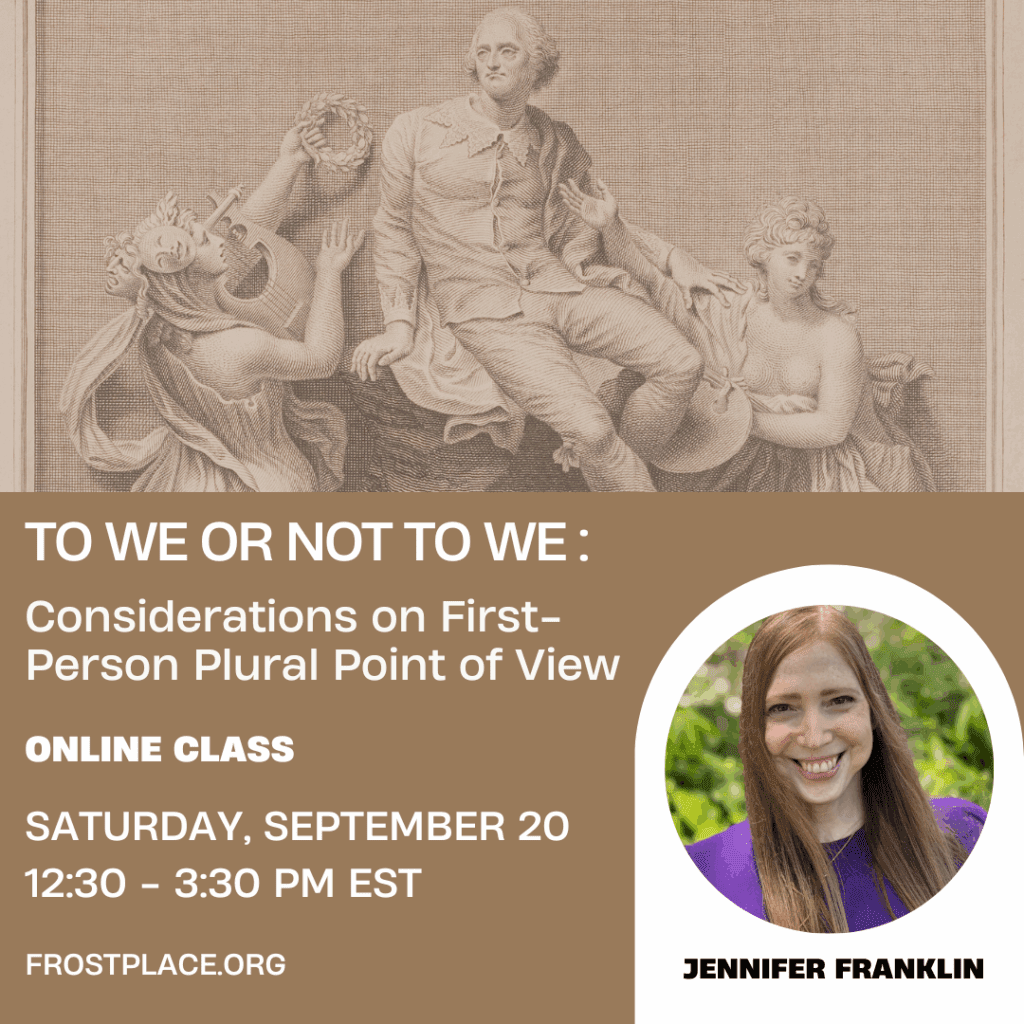
So much contemporary poetry centers on the “lyric I.” Since the self is already unknowable and shifting, how and when can a poet presume to speak for others, even others in their own community? In this class, we will look at poems that use “we” as a powerful tool of resistance (Charles Simic, Carolyn Forché), as thought-provoking social commentary (Ilya Kaminsky, Wislawa Szymborska), or to encourage collective unity (Ross Gay, Claudia Rankine). In direct opposition to poems that use the “colonial we,” Judith Butler interprets “we the people” as a statement that is both linguistic and embodied as a call to action. We will examine some of our own poems that might benefit from the introduction of “the lyric we” or the “imperative we” and we will discuss pitfalls to avoid while deciding to employ the first-person plural. We will read poems by Auden, Larkin, Ostriker, Kaminsky, Brown, Szymborksa, Pollock, Vang, Bang, Brock-Broido, Gluck, Doty, Simic, Forché, Farris, Smith, Bass, Laux, and Hirshfield.
Jennifer Franklin is the author of three poetry collections, including If Some God Shakes Your House (Four Way Books), finalist for the Paterson Prize and Julie Suk Award. Her work has been commissioned by The Metropolitan Museum and published in American Poetry Review, The Paris Review, “poem-a-day” on poets.org, The Nation, and Poetry Society of America’s “Poetry in Motion.” She won a Pushcart Prize, a NYFA grant, and a CRCF Award. She is cofounder and cohost of the reading series “Words Like Blades.” Her new manuscript, A FIRE IN HER BRAIN is a series of epistolary poems to Virginia Woolf, Lucia Joyce, and Sylvia Plath. She teaches in Manhattanville’s MFA program, Poets House, The Frost Place, 24Pearl Street & her own manuscript revision workshops.
Congeries, Catalogues, and Lists with Tina Cane
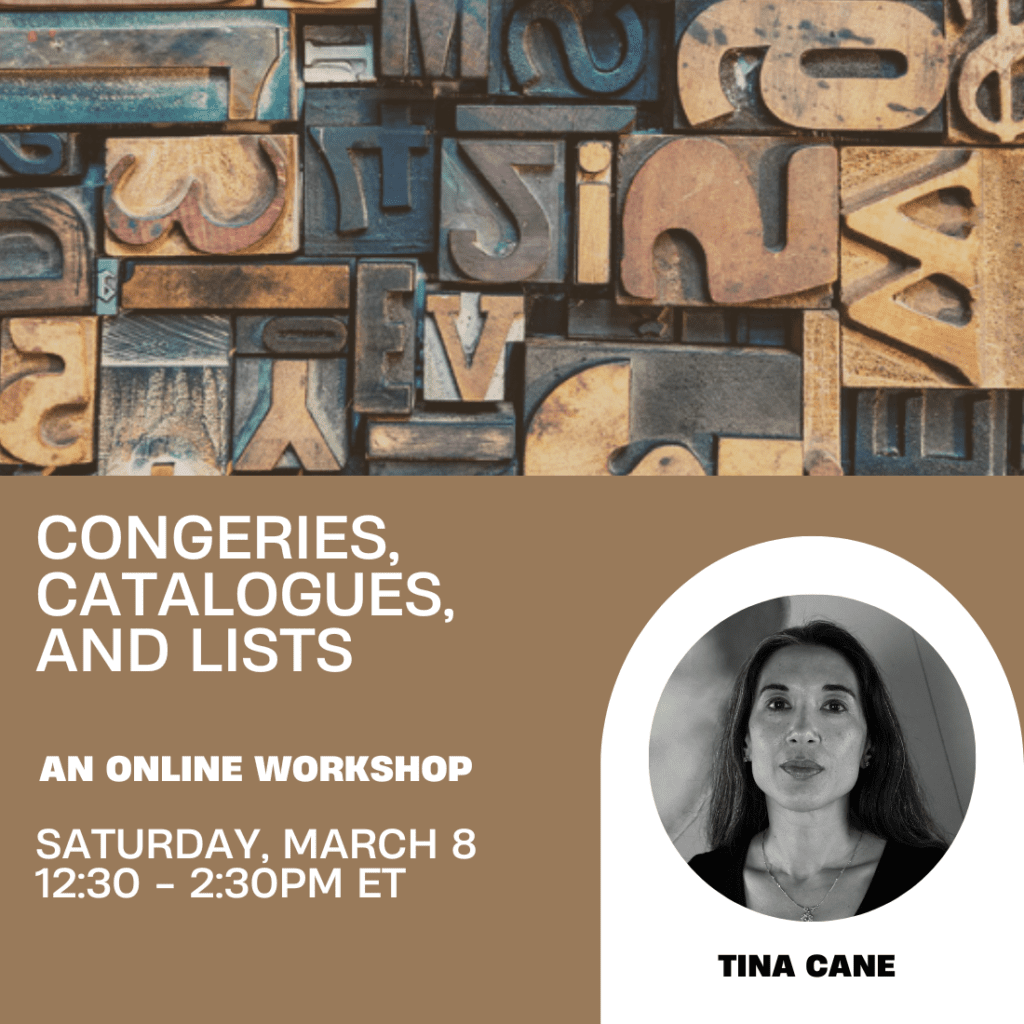
My life is ruled by lists — not the top-ten type — but the scrawled kind I find stashed post-season in winter coats or crumpled at the bottom of my bottomless bag. Lists like: “vodka, milk, apples, cookies, bananas, eggs, soap.” There is poetry in this. Not because I am a poet but because, like you, I am busy and, in the ensemble, these lists reveal the habits of a life — a life of drinking vodka and eating bananas, of washing one’s hands. They also chart an ever-changing cycle of concerns—which is the province of poetry. In this generative workshop, we will think about form, intention, the cumulative tension and power of lists, and how they fit into our concept of what a poem is. We will discover how catalogue and compendium can unlock creativity, and can potentially map the course for a cycle of poems.
About Tina
Tina Cane is the founder/director of Writers-in-the-Schools, RI, and, from 2016-2024, served as the Poet Laureate of Rhode Island where she lives with her husband and three children. In her capacity as poet laureate, Cane established her state’s first youth poetry ambassador program in partnership with Rhode Island Center for the Book, and brought the Poetry-in-Motion program from the New York City Transit System to Rhode Island’s state-wide buses. Cane is the author of The Fifth Thought, Dear Elena: Letters for Elena Ferrante, poems with art by Esther Solondz (Skillman Books, 2016), Once More With Feeling (Veliz Books 2017), Body of Work (Veliz Books, 2019), and Year of the Murder Hornet (Veliz Books, 2022). In 2016, Tina received the Fellowship Merit Award in Poetry, from the Rhode Island State Council on the Arts. She was also a 2020 Poet Laureate Fellow with the Academy of American Poets. Her debut novel-in-verse for young adults, Alma Presses Play (Penguin/Random House) was released in September 2021. Cane is also the creator/ curator of the distance reading series, Poetry is Bread, and the editor of Poetry is Bread: The Anthology (forthcoming from Nirala Press, 2024). Her second verse novel for young readers, Are You Nobody Too? (Penguin/ Random House) was released in August 2024.
Turning Toward a Mystery with Blas Falconer
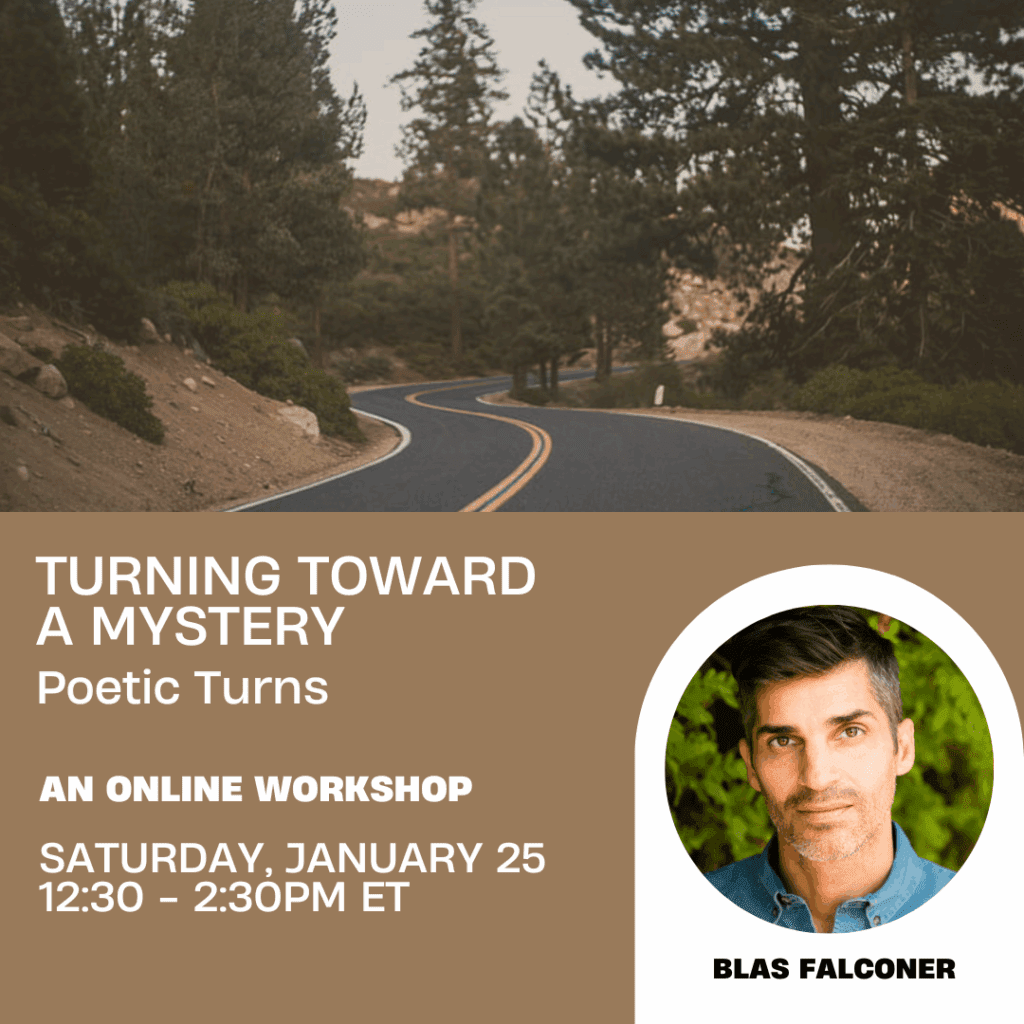
What do we mean by the “poetic turn”? I think of it as a change of gears, a ship tacking on the water, any shift in the poem, rhetorical or formal, from description to reflection, from question to answer, from one Point of View to another, from statement to contradiction—it’s a swing of the camera’s lens, a new voice or tone, a new language, a break in rhyme or meter. There are countless ways that a poem can turn, and the turn of a poem can be quiet and subtle or dramatic and unsettling.
Kim Addonizio says: “A turn is … a measure of energy… The leap from one synapse to another…one level of understanding…to being in the presence of the mystery.” In his essay “Bivalves,” Carl Phillips considers … “the hinge…as a way to get the reader from one place to another…part of the poem’s musculature, … [giving] an athleticism to the poem, even as it also promotes momentum.” In an interview, Hayan Charara says, “The “poetic turn” is another way to talk about misdirection. Some part of the poem…builds expectation, then it turns against that expectation.” Gregory Pardlo says, “If a poem doesn’t have a turn, I want my money back.”
Looking at a variety of poems, we’ll discuss the kinds of turns we make and the ones we have yet to risk. We will consider how the turn displays the poet’s particular imagination, that impulse towards mystery—boundless, infinite. We will consider how participants can apply the ideas from the workshop to their own poems.
About Blas
Blas Falconer is the author of four poetry collections, including Rara Avis (Four Way Books, 2024) and Forgive the Body This Failure (Four Way Books, 2018). He is also the co-editor of two anthologies: The Other Latin@: Writing Against a Singular Identity (The University of Arizona Press, 2011), with Lorraine M. López, and Mentor and Muse: Essays from Poets to Poets (Southern Illinois University Press, 2010), with Beth Martinelli and Helena Mesa. Falconer is the recipient of a poetry fellowship from the National Endowment for the Arts and a Maureen Egen Writers Exchange Award from Poets & Writers. He teaches in the San Diego State University MFA program and is the editor-in-chief at Poetry International Online.
Poetic Closure with Janice N. Harrington
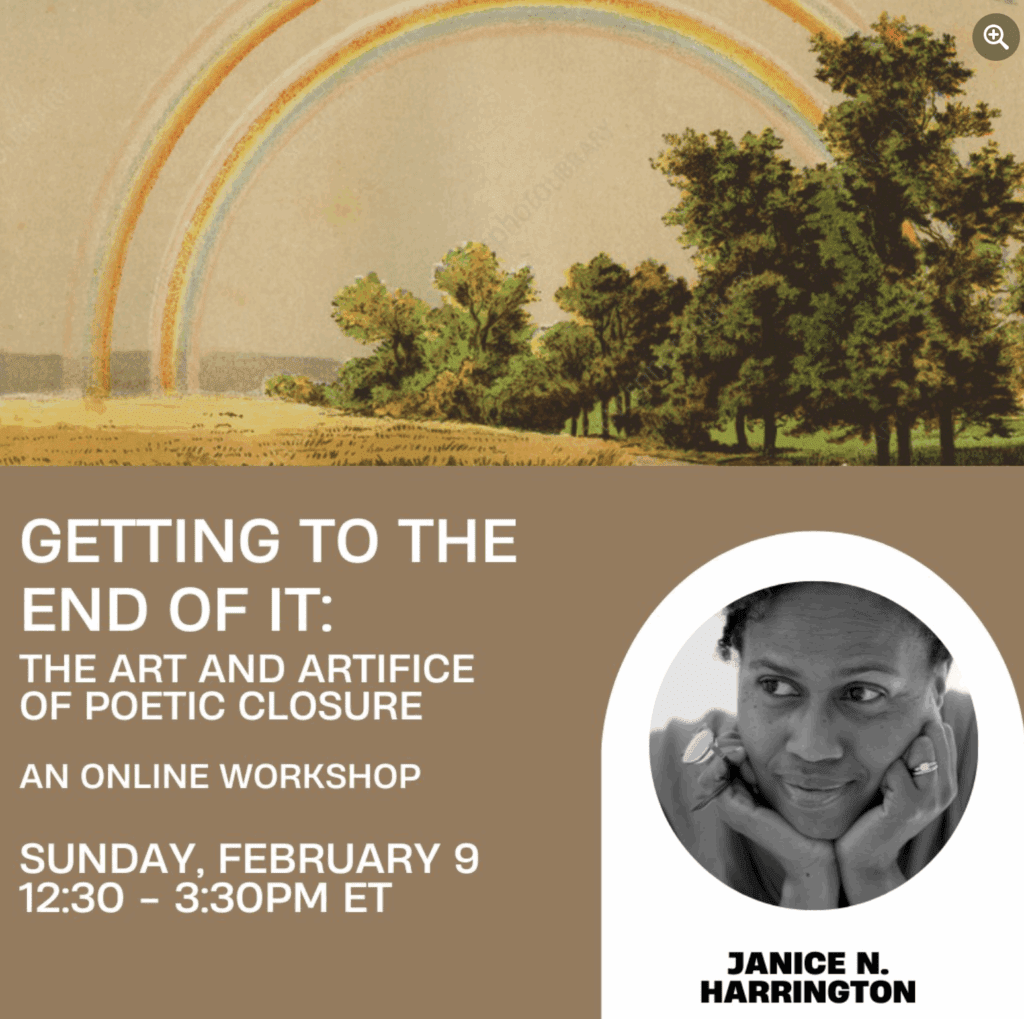
How do you end your poems? In this generative writing workshop, participants will study how poets shape and explore poetic closure. We will study poems by diverse contemporary poets and use their poems as compasses and mentors for rethinking and re-envisioning alternative endings for the poems that we have written. Participants will also draw on the craft of other art forms and learn strategies for shaping an ending for that nothing-seems-to-work-for-it poem.
About Janice
Janice N. Harrington’s latest book of poetry Yard Show (BOA Editions 2024) grows out of her three earlier books of poems, Even the Hollow My Body Made Is Gone, The Hands of Strangers, and Primitive: The Art and Life of Horace H. Pippin. Harrington is also an award-winning children’s author, a Cave Canem fellow, and teaches creative writing at the University of Illinois at Urbana-Champaign.
Financial Aid
The Frost Place is committed to fostering an inclusive environment. If class fees are incompatible with your budget, we encourage you to apply for financial aid.
Assistance is available as funds allow. Aid may only be used for future programming and cannot be applied retroactively.